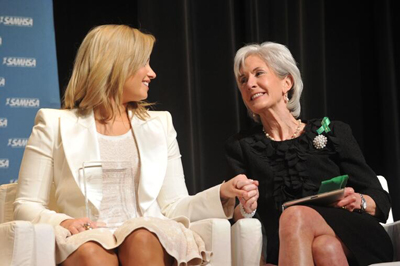Singing Out for Kid's Mental Health
Author: Bob Carolla - 5/7/2013
 |
Singer Demi Lovato and Kathleen Sebelius, Sectretary of Health and
Human Services at the Substance Abuse and Mental health Services
Administration (SAMHSA) press conference marking Children's Mental
Awareness Day on May 7. (Photo: Twitter: @Sebelius (Kathleen Sebelius)) |
One of the highlights of Mental Health Month is Children’s Mental Health Week, May 6-11, 2013—and Tuesday traditionally is considered “Children’s Mental Health Awareness Day.”
In the nation’s capital, the U.S. Substance Abuse and Mental Health Services Administration (SAMHSA), NAMI and other mental health organization seized the day to speak out on the need for a full array of effective services and supports for youth with mental illnesses.
SAMHSA sponsored a press conference with U.S Department of Health and Services (HHS) Secretary Kathryn Sebilius and 21-year old singer, songwriter and actress Demi Lovato, who lives with bipolar disorder.
“I think it bears repeating that we have no higher obligation as a society, as our president reminds us, than keeping our children safe and protecting their health. It’s our most fundamental task,” said Sebelius. We can do better. We need to do better and we must do better. Early detection and treatment can make a huge difference.”
When you have a mental health issue or you’re suffering through substance abuse, you’re going to have days when you struggle,” said Lovato, who was named honorary chair of the day. “But healing is the first step to resilience.”
“I grew up in the public eye from a very young age. But like many, I felt the pressure to be perfect; to look perfect. That pressure wears on kids, especially young women. Now imagine those feelings while struggling with a mental health issue or substance abuse.”
Online, SAMHSA presented several short videos, including an additional message from Lovato as part of the day’s events.
On Capitol Hill, NAMI moderated a congressional briefing that focused ion SAMHSA programs for youth and young adults. U.S., Reps. Grace Napolitano (D-Ca.) and Tim Murphy (R-Pa.) who co-chair the House Mental Health Caucus also spoke.
Facts presented in the briefing include:
- Thirteen percent of young people ages 8 to 15 live with mental illness. For ages 13 to 18 the number increases to 20 percent.
- One-half of all lifetime cases of mental illness begin by age 24. Early identification and intervention is needed to improve outcomes, before conditions become more serious, more costly and more difficult to treat.
- Despite the fact that effective treatment exist, average delays of between eight and 10 years occur between the onset of symptoms and intervention—which coincides with critical developmental years. Only about 20 percent of youth with mental health conditions get the help they need.
In the national dialogue on mental that has occurred since the Newtown tragedy in December 2012, NAMI concerns for youth have included mental health screening school-based mental health services and family education and support. One of NAMI’s signature education programs is NAMI Basics, for parents and other caregivers of children and adolescents who have developed symptoms of mental illness before age 13.